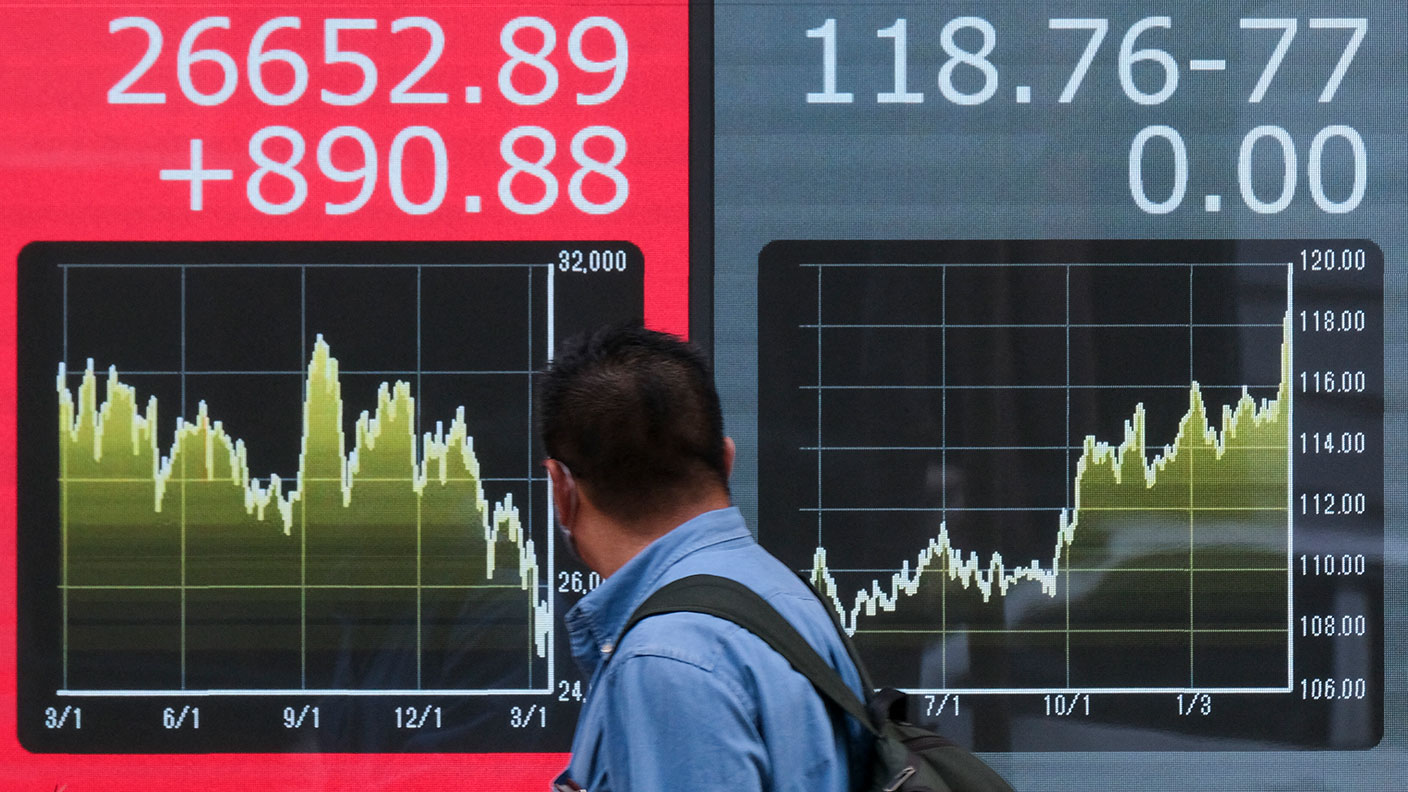Looking for Isa season ideas? Load up on investment trusts
Investment trusts have had a poor start to the year. But, while there are still plenty of risks, there are plenty of opportunities too. Max King looks at the sectors to buy.

The investment trust sector as a whole has had a poor start to the year, with the closed-end investments index down 14% (as of 16 March) compared with a fall of 4.2% in the All-Share index.
In part, this reflects a long-overdue bounce in the UK market relative to overseas markets – the S&P 500 is down 9.4% and the Eurostoxx 600 down 8.3%. The investment trust index is heavily weighted to overseas markets.
Also important is that the average discount of share prices to net asset value (NAV) in the sector has risen from 1.5% to 5.4%, implying that the value of the average underlying portfolio has not lost quite as much – more like 10%.
MoneyWeek
Subscribe to MoneyWeek today and get your first six magazine issues absolutely FREE

Sign up to Money Morning
Don't miss the latest investment and personal finances news, market analysis, plus money-saving tips with our free twice-daily newsletter
Don't miss the latest investment and personal finances news, market analysis, plus money-saving tips with our free twice-daily newsletter
Is there further to fall, or is this a buying opportunity?
Investors are rattled – and fund managers are gloomy
Further factors that have hit the investment trust sector so far this year include the significant exposure to underperforming small and mid-cap stocks around the world; the bias of the sector to growth rather than value; the occasional disaster, such as JP Morgan Russia (down 88%); and the rise in bond yields.
This has dampened the enthusiasm of investors in recent years for the high-yielding alternatives sectors, including infrastructure, renewable energy and property.
Investors have had their fingers burnt, which has exacerbated a pre-existing wariness to invest resulting from the resurgence of inflation and the Russian invasion of Ukraine. Professional investors as well as private ones have decided that discretion is the better part of valour and chosen to sit on the side-lines.
The latest Bank of America Merrill Lynch survey of fund managers for example, showed that most investors expect a bear market this year, with the growth outlook at its lowest level since the 2008 financial crisis. “Stagflation” expectations increased to 62% of responses with Ukraine cited as the biggest risk (44% of fund managers), recession (21%) and inflation (18%).
In the widely-followed AAII survey of investors, meanwhile, the ratio of bulls to bears has dropped below one (ie more bears than bulls) for the first time in nearly two years having reached four last year.
Meanwhile, the yield on 10-year US Treasuries has risen to 2.18%, the highest for nearly three years. With US inflation recently recorded at nearly 8% and the Federal Reserve raising rates to combat it (as is the Bank of England), investors are not feeling brave.
There are plenty of risks – but there are also potential upsides
It’s times like these that contrarian investors relish. They know that negative survey responses, such as the AAII below one, are often reliable “buy” indicators – maybe not immediately, but it rarely pays to wait. Markets anticipate improvements in the news rather than responding to it and there are already positive signs.
The oil price has dipped below $100 a barrel, suggesting that inflationary pressures will abate. Interest rates and bond yields should rise further but they are not going anywhere near the current inflation rate. An economic slow-down is likely – but not a recession.
As for Putin’s invasion of Ukraine, it may not feel like it now, but in the long run, it could reduce geopolitical uncertainty. How so? As Diana Choyleva of Enodo Economics points out, “yielding ground to Putin now or later would only make the world a much more hostile and unstable place for the free liberal democracies.”
However, defeat for Putin would have the benefit of isolating China. “For China, the worst-case scenario would be for Putin to lose power and for Russia to turn towards Europe, leaving China surrounded by US and Western forces. If the West is decisive now, Xi Jinping would find more value in stepping away from the conflict.”
Meanwhile, on a forward price/earnings multiple of 18.1, according to Yardeni Research, down from a peak of 22.7, the US market is no longer expensive, assuming earnings forecasts are fulfilled.
Small and mid-caps are cheaper on forward multiples of 13.4 and 13.7. Valuations in other markets, including the UK, are similar. Rising earnings means that these multiples will fall further, even if markets stand still.
Buyers of investment trusts stand to benefit from three further factors. As valuations have improved, many managers have borrowed money to invest (what’s known as “gearing”), enhancing prospective returns when markets recover. The widening in discounts should reverse as markets rebound, giving investors a bonus return. In the medium-to-longer-term, historic data shows that the average investment trust outperforms its benchmark index.
There are no guarantees as to the short term – an investment with no apparent downside is always highly dangerous – but, for the moderately patient, good returns look about as assured as they ever are.
Investors usually leave subscribing their Individual Savings Accounts (Isas) to the end of the tax year and so miss out on the returns in earlier months. This year is the exception; investing in the last few weeks should turn out to be the most rewarding.
The only question is: what to buy? There’s plenty of opportunity. Small-cap trusts look exceptionally attractive. So do the healthcare and biotech sectors. The bear market in growth stocks looks near or at its end.
Emerging markets and Japan are highly attractive. Forget about European economics and politics and look at the great companies based there. The American market is reassuringly more expensive – but the US is self-sufficient in energy.
With share prices down, dividend yields attractive and a strong element of inflation protection to them, the alternative sectors look very attractive. The discounts in private equity are almost eye-watering. Global funds are always a good default option.
In fact, at these levels, you might as well throw a dart at the sector and invest wherever it lands.
Get the latest financial news, insights and expert analysis from our award-winning MoneyWeek team, to help you understand what really matters when it comes to your finances.

Max has an Economics degree from the University of Cambridge and is a chartered accountant. He worked at Investec Asset Management for 12 years, managing multi-asset funds investing in internally and externally managed funds, including investment trusts. This included a fund of investment trusts which grew to £120m+. Max has managed ten investment trusts (winning many awards) and sat on the boards of three trusts – two directorships are still active.
After 39 years in financial services, including 30 as a professional fund manager, Max took semi-retirement in 2017. Max has been a MoneyWeek columnist since 2016 writing about investment funds and more generally on markets online, plus occasional opinion pieces. He also writes for the Investment Trust Handbook each year and has contributed to The Daily Telegraph and other publications. See here for details of current investments held by Max.
-
 Should you buy an active ETF?
Should you buy an active ETF?ETFs are often mischaracterised as passive products, but they can be a convenient way to add active management to your portfolio
-
 Power up your pension before 5 April – easy ways to save before the tax year end
Power up your pension before 5 April – easy ways to save before the tax year endWith the end of the tax year looming, pension savers currently have a window to review and maximise what’s going into their retirement funds – we look at how
-
 Fund inflows hit a six-month high in November – where are investors putting their money?
Fund inflows hit a six-month high in November – where are investors putting their money?Investors returned to the financial markets amid the Autumn Budget in November 2025 but caution remains.
-
 The top stocks of 2025 - did you pick a winner?
The top stocks of 2025 - did you pick a winner?Last year was a chaotic one for the stock market, but which stocks did investors buy the most of?
-
 Canada will be a winner in this new era of deglobalisation and populism
Canada will be a winner in this new era of deglobalisation and populismGreg Eckel, portfolio manager at Canadian General Investments, selects three Canadian stocks
-
 Best-performing stocks in the S&P 500
Best-performing stocks in the S&P 500We take a look at the best-performing stocks in the US equity market. Are there opportunities outside of Big Tech?
-
 What is Vix – the fear index?
What is Vix – the fear index?What is Vix? We explain how the fear index could guide your investment decisions.
-
 The case for dividend growth stocks
The case for dividend growth stocksMany investors focus on yield alone when looking for income, that’s a mistake says Rupert Hargreaves. It’s the potential for dividend growth that really matters.
-
 Halifax: House price slump continues as prices slide for the sixth consecutive month
Halifax: House price slump continues as prices slide for the sixth consecutive monthUK house prices fell again in September as buyers returned, but the slowdown was not as fast as anticipated, latest Halifax data shows. Where are house prices falling the most?
-
 Rents hit a record high - but is the opportunity for buy-to-let investors still strong?
Rents hit a record high - but is the opportunity for buy-to-let investors still strong?UK rent prices have hit a record high with the average hitting over £1,200 a month says Rightmove. Are there still opportunities in buy-to-let?
